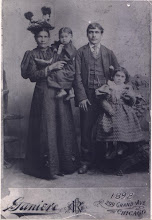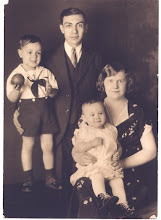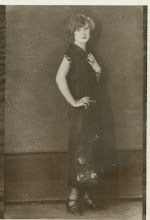I didn't know that the Italian revolution was actually a series of revolutions, starting from Napoleon, to the smaller revolution in 1822 (remember Francisco Paulo DiGrazia and the carbonari?) They got more organized by 1848 and the Carbonari were then called Giovane Italia (although today everyone still calls them carbonari).
There was another DeGrazia from Calvello. While Francisco Paulo DiGrazia was a victim of the carbonari in 1822, Giovanni DeGrazia was a carbonaro. He was, in fact, indirectly connected to the Ferri family. Giovanni DeGrazia was a young man around 21 years of age. He was born in Calvello, son of Biago DeGrazia and of the family of the d'Aquila in Anzi. The D'Aquila's in Naples were said to descend from the same family as St Thomas Aquinas… I'm not sure if this family of d'Aqullas were related to the Naples family, but they were weathly and influential, just like the Ferris. In Fact, Giovanni was good friends with Archangelo Battaglia from Anzi who was the father of Michalina Ferri.
In 1848, the Caronbari had organized many young men schooled in Naples (mostly as legale… there was a lot of lawsuits in those days). Giovanni was one such young man. Like many others, he was "recruited/drafted" into the Bourbon Calvalry. Even at the young age of 21, he was tall, dashing, strong and (I think) an apparent leader. He was charged with a battalion of troops and worked under a general as one of the first officers. One day, in May 1848, his troops refused to move forward, in effect most deserted the cause. A battle ensued and Giovanni suffered a near mortal chest wound. As it turned out, the general himself was a carbonari. Giovanni was thrown into prison on the island of Procida.
After many months, maybe even a couple of years, there was eventually a trial of about 200 men charged for the activities of May 1848. Giovanni was accused of treason and of encouraging his men to desert, he was first sentenced to death. He pled "no contest" . The "defense" for all 200 or so men, basically got on a soap box about how it was moral to be disloyal to an immoral government. He didn't seem to try to show that anyone didn't do what they were accused of. Giovanni ended up getting sentenced to 25 years in chains which means he was chained to another man for the length of the sentence (or until his mate died, I guess)
The revolution of 1848 failed and, in fact, made the Bourbon king even more paranoid and if anyone was thought to be subversive or even if he made casual comments against the government, he would end up in jail (like Michelina's father)
After 1860, when the revolution, under Garibaldi, finally succeeded. Giovanni was released. In a Naples paper, I found a proclamation that talked about many of the freed political prisoners and how they were recompensed for their patriotism. Giovanni was made the chief inspector of the Naples police.
I next found a reference to Giovanni in the paper when he was accused of falsely arresting Gioseppe Libertini. Libertini was a man of great character. He was a great statesman for Italian liberty and actually was a politician (a senator?) both before and after the revolution. (Just like our government, many of the players actually stayed the same before and after).
Libertini had supported both Victorio Emmanuel (the new king) but during the revolution, he also supported Garabaldi. Since the king (VE) didn't trust Garabaldi), he also didn't trust Libertini. Garabaldi was exiled from Italy and there were many civil protests in support of him as he was well loved by the people. Apparently the only charge against Libertini is that he was observed watching one of these protests (not pro-Garabaldi), just watching the event.
I think that Giovanni DeGrazia must have been ordered to find a way to arrest Libertini. One night, he and a couple of other men, dressed in regular civilian clothing arrived at Libertini's home… Giovanni introducing himself as a paisano/fellow patriot come for a social visit. As Libertini greeted him, the other men arrested him and took him to jail for 3 days.
Finally a judge dismissed the charges, but the city was in an outrage. A woman was quoted as denouncing Giovanni DeGrazia and saying Liberals should be taken out of office.
Libertini had been offered various prestigious positions in VE's government, but each time he refused because he felt he was not qualified and better served the public as an elected official. After this event, he retired from public office altogether and headed back to his home town of Lecce (a lovely Baroche town in the heel of Italy).
I could find nothing more of Giovanni. I'm curious whether he came back to Calvello because in 1872, when a Ferri was mayor of Calvello, Giovanni DIGrazia, a legale, served one term on the city council. Since the name was spelled differently, I can only guess that this was the same man, however the timing is right.
So, was he a good guy or a bad guy? I really wish that he had written a diary so that I can understand his motivations…. And I wish there hadn't been so many Di/DeGrazia's in Calvello so I could somehow trace if we were related to him.
Maria
PS: After I came home, Luccio Ferri sent me a newspaper clipping that he found in his father's archives. It was an article written by his uncle (a someone famous writer in that province). It was a eulogy/obituary for Giovanni DeGrazia who was apparently a good friend of his. Giovanni was married and had many children (I think it was 13 children) and lived in Calvello. He was touted for being a true patriot, a great father, and an important citizen.






No comments:
Post a Comment